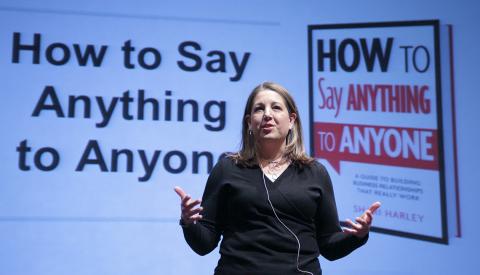Keys to Developing Trust
Set Expectations, Build Agreement, Harley Advises

Photo: Bill Branson
Your mother always told you: don’t say anything if you’ve nothing nice to say. That advice, according to Shari Harley, is a hindrance to building effective relationships in the workplace.
“We aren’t saying what we want to say, not because we don’t know how, but because we are afraid the other person is going to freak out,” said Harley, president of Candid Culture, at a recent Deputy Director for Management Seminar Series in Masur Auditorium.
And that’s where candor comes in. She defined it as “how we agree to work together; here is what a good job looks like and here’s how we’re going to interact.” When this framework is absent, employees are apt to talk about their coworkers rather than talking to them. Another drawback: managers don’t make clear to their employees what the expectations of the job are.
“If you want to control your career and experience here, you have to find out what people want,” Harley said.
Supervisors must set clear expectations so their employees don’t have to guess. “People aren’t you,” she noted. “They don’t approach work the same way you do.”
As an example, Harley said one of her clients spent a considerable amount of time and effort each week assembling a 30-page business report for his boss. One day, the client personally delivered the report. The boss flipped to the final page, read a chart and stopped reading. The employee was wasting time on a paper his boss never read. However, the employee never knew that because he always emailed the report.
Almost all communication breakdowns are predictable and preventable, says Harley. To avoid these problems, workers must know about each other’s deal breakers, pet peeves, likes and dislikes.
Knowing about deal breakers is especially important. Last year, Harley had a baby. Before she had the baby, she traveled to 4 or 5 states each week for work. Since she’s had her child, she will only travel to one location a week.
Ideally, workers and their supervisors are able to build trust in their relationship by asking more questions and getting to know each other better, so they don’t have to rely solely on feedback, which is plan B. But you can’t anticipate and ask about everything. Sometimes it’s not possible to prevent a breakdown.
“What makes work hard is the humans,” Harley said. “It’s not the work at hand. It’s the people, it’s the personalities, the power struggles.”

Photo: Bill Branson
The purpose of feedback is to encourage someone to change or repeat a behavior. When workers provide feedback to colleagues, Harley suggested they should introduce the conversation, state why the topic is important and describe concretely the behavior that must be changed.
“You have to give people something specific,” she said, if the goal is to alter behavior. People interpret vagueness as judgmental. The feedback should also be short, because “no one wants to hear for 20 to 40 minutes that they’re not performing.”
Feedback conversations should be just that, a dialogue. Both people talk. Harley suggests the recipient of feedback says “thank you” to the giver. Acknowledging feedback can be disarming and buys time to respond. Don’t trust what will come out of your mouth when you’re upset. Wait to respond, she counseled.
After that, the feedback providers should request a specific change or behavior he or she wants the recipient to replicate, then try to build a consensus on what happens next. The conversation should end with a “thank you.”
Those who attempt to get to know others better and build trust by asking more questions might not succeed, she warned. Coworkers might not respond, they may lie or say what they think their coworker wants to hear. In those cases, “at least you’re someone who asked.
“Everything we did today is very simple, but very hard to do,” Harley concluded.
